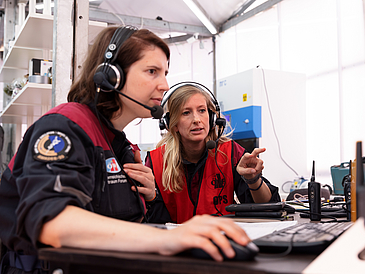Vera Hagemann, Lara Watermann, Florian Klonek, Christiane Heinicke
Acta Astronautica Article 210 (2023) ,162-175
doi:https://doi.org/10.1016/j.actaastro.2023.05.021, preprint available open access https://arxiv.org/abs/2305.15415
Astronaut crews and ground control support teams are highly interdependent teams that need to communicate effectively to achieve a safe mission - despite being separated by large distances. Team communication quality with its facets clarity of objectives and information flow, is a key coordination process to achieve high team performance and task satisfaction. Especially in interdependent teams working in extreme environments with time-delayed communications, the team's success is threatened if communication is ineffective. In this study, we hypothesized that communication quality affects two key team outcomes, performance and task satisfaction, and that these effects can be explained by increases in workload (effort and frustration). Hypotheses were tested during the AMADEE-20 analog Mars mission hosted by the Austrian Space Forum. The analog astronauts (AA) were supported by an On-Site-Support (OSS) team and a remote Mission-Support-Centre (MSC) team. The MSC was the only contact line for both AA and OSS, and the communication between them had a one-way time delay of 10 min. Our study consisted of three runs in which members across the three different multiteam systems had to exchange information to solve an interdependent task. We measured communication quality, effort and frustration, task satisfaction, and team performance. Results show that clarity of objectives and information flow positively impacted multiteam system performance. Furthermore, clarity of objectives reduced experienced effort and this in turn enhances team performance. High levels of information flow reduced experienced frustration, which in turn enhanced task satisfaction. Our findings show that these facets of communication quality are essential for multiteam systems that work separated from each other by a distance. We stress that specific (team) communication training for astronauts and support personnel will be key to effective teamwork during future Mars missions, and thus to overall mission success.
© 2023 IAA. Published by Elsevier Ltd. All rights reserved.
preprint licensed under CC BY-NC-SA 4.0
This publication is a result of the Humans on Mars Initiative.


